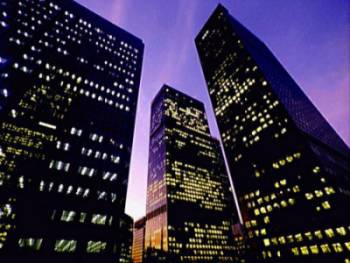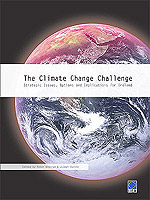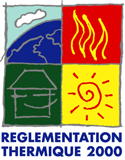Sustainable Energy
in the Built Environment
&
Climate Change

December 2007
Ministry of the Environment - Japan
Discussion Document in English
Building a Low Carbon Society
Click Here to Download PDF
(PDF File, 3.74Mb)
EU Council Spring Summit - 8th & 9th March 2007
Presidency Conclusions
Important New EU Energy Targets
Click here to Download PDF
(PDF File, 228kb)
WBCSD
World Business Council for Sustainable Development
October 2007 - Summary Report
Energy Efficiency in Buildings
Business Realities & Opportunities
Click Here to Download PDF
(PDF File, 2.92Mb)
Dublin 2007 & 2008
Institute of International & European Affairs (IIEA) - Climate Change Project
Sectors Working Group
Meeting the Challenge of the 1997 Kyoto Protocol is difficult.
But, after the
2007 June G8 Summit in Germany (see Chair's Summary),
and the
wide consensus at Bali in December 2007 (see Bali Action Plan),
a Kyoto II Instrument (2013-2020) will be developed
within the UNFCCC Framework.
The Implications for Ireland will be Harsh !

29th September 2008
The Climate Change Challenge
A Strategic Overview of Irish Climate Change Policy
Click Here to Download PDF
(PDF File, 584kb)
C J Walsh
Construction Sector (Ireland) Report
Part 1 - Restoring the Sector's Infrastructure
Click Here to Download PDF
(PDF File, 80kb)
Part 2 - 2020 Building Energy Performance Targets
Click Here to Download PDF
(PDF File, 30kb)
Ireland - Statutory Instrument No. 666 of 2006
European Communities (Energy Performance
of Buildings) Regulations 2006
Click Here to Download PDF
(PDF File, 648kb)
The Irish national legislation which implements/transposes
European Directive 2002/91/EC (see below) is deeply flawed and designed
to be ineffective. But, it is a clever moneymaking exercise !
European Energy Atlas
This WebSite provides a comprehensive review of technologies
relevant to the whole non-nuclear energy field, with the exception of oil and gas,
to a time horizon of 2010.
The Energy Cycle
The entire energy chain, including activities related to prospecting for, exploration, production, conversion, storage, transport, distribution and consumption of the various forms of energy, and the treatment and disposal of wastes, as well as the decommissioning, cessation or closure of these activities, minimizing harmful environmental impacts.
1994 European Energy Charter Treaty
Environmental Impact
Any effect caused by a given activity on the environment, including human health and safety (and welfare), flora, fauna, soil, air, water, (and especially representative samples of natural ecosystems), climate, landscape and historical monuments or other physical structures or the interactions among these factors ; it also includes effects on accessibility, cultural heritage or socio-economic conditions resulting from alterations to those factors.
1994 Energy Charter Treaty (EU)
and 1972 Stockholm Declaration on the Human Environment (UN)
EEA Report 8/2006
European Environment Agency
Tracking Progress Towards Integration
of
Energy & Environment in the European Union
Click Here to Download PDF
(PDF File, 1.86Mb)
RETScreen International

The RETScreen International Clean Energy Project Analysis Software is a unique decision support tool developed with the contribution of numerous international experts from government, industry, and academia. The software, provided free-of-charge, can be used worldwide to evaluate the energy production and savings, life-cycle costs, emission reductions, financial viability and risk for various types of energy efficient and renewable energy technologies (RETs).
The software also includes Product, Cost and Climate Databases, and a detailed online User Manual. Other tools include: a case study based college/university-level training course; an engineering electronic textbook; and the RETScreen Support WebSite.
All of these tools are available free-of-charge in English and French, with many of the tools available in other languages.
RETScreen International is managed under the leadership and ongoing financial support of Natural Resources Canada’s (NRCan) CANMET Energy Technology Centre - Varennes (CETC-Varennes). RETScreen is developed in collaboration with a number of other government and multilateral organisations, and with technical support from a large network of international experts from industry, government and academia.
Just a few of RETScreen International's Partners:

RETScreen International Clean Energy Project Analysis Software
Choose your language & Download
Special EuroBarometer
Fieldwork: October-November 2005
Published: 24th January 2006
Attitudes Towards Energy
Click Here to Download PDF
(PDF File, 561kb)
PowerPoint Presentation
'Real' Energy Performance in Buildings
C J Walsh
Technical Guidance Note 95 /101 (a)
Energy Survey Reports
Click here to Download PDF
(PDF File, 60kb)
European Environment Agency Report No. 3/2006
Transport & Environment: Facing a Dilemma
Click to Download PDF
(PDF File, 3.73Mb)
European Commission DG TREN
COM(2006) 105 final - 8th March 2006
Green Paper
A European Strategy for Sustainable, Competitive & Secure Energy
Click to Download PDF
(PDF File, 200kb)
A stark picture of the Energy Situation in Europe is painted ....
- There is an urgent need for investment to replace ageing infrastructure. An investment of around One Trillion Euros will be required over the next 20 years ;
- Import dependency is rising. In the next 20-30 years, approx. 70% of the European Union’s energy requirements will be met by imported products, compared with 50% today ;
- Reserves are concentrated in a few countries. Roughly half of the EU’s gas consumption comes from only three countries ( Russia, Norway, Algeria) today. On current trends, gas imports will increase to 80% over the next 25 years ;
- Global demand for energy is increasing. By 2030, world energy demand and CO 2 emissions are expected to rise by approx. 60%. Global oil consumption has already increased by 20% since 1994, and global oil demand is projected to grow by 1.6% per annum ;
- Oil and gas prices continue to rise - they have nearly doubled in the EU over the past two years, with electricity prices following ;
- Europe 's climate is getting warmer ;
- An internal energy market, which is both well regulated and competitive, has not yet been established in Europe. So much for 1992 !
However .... the Institutional Response to this picture proposed in the Green Paper is weak, incoherent and not properly co-ordinated with the policies and programmes of other Directorates-General in the European Commission.
Already .... the EU Directive 2002/91/EC on Energy Performance in Buildings, developed by DG TREN, must be seen as a bad joke in the context of the Construction Products Directive Framework (EU Directive 89/106/EEC), being operated by DG Enterprise !
And .... if Commissioner Piebalgs (DG TREN), who recently visited the Institute for European Affairs in Dublin (2006-03-21), is so concerned about Energy-Efficiency and Renewable Energies, why is the first mention of these issues only to be found half-way through the Green Paper ?
European ENERGY Policy must be brought fully within the EU's Community Method of Co-Ordination.
Sustainable
Energy Strategy for the European Union
2010
Adapted
from Chapter 7 (by C. J. Walsh)
of
Sustainable Energy and the Environmental Imperative
A Report of the SEED
Research Group, Institute of European Affairs, Dublin
Published 1999, by the IEA, Dublin. ISBN 1-874109-50-8
At the time of writing, it is only possible to describe and discuss
the concept of 'sustainable development' in a tentative way. It
is important, however, that five aspects of the concept receive
adequate attention, i.e. social, economic, environmental, institutional,
and political. It is also worth re-stating, here, that essential
components of 'social wellbeing' include direct and meaningful
consultation with people, partnership between all sectors of society,
consensus, transparency, and openness at institutional levels.
Outlined below are three options for the short term future, up
to the year 2010, concerning the implementation of a sustainable
energy strategy in the European Union ........
- Option 1 : ' Business as Usual '
In the absence of a clearly expressed wish on the part of European
society (including its institutions) to accept the financial costs
and lifestyle changes necessary to achieve 'sustainability', and
as long as other important members of the international community
avoid or delay compliance with the 1997 Kyoto Protocol (COP 3),
there will be a strong temptation to continue with a 'business
as usual' scenario in Europe. This option will be characterised
by :
- Even greater
dependence on fossil fuels as the major energy source ;
- A more
tenuous relationship between energy consumption and consumer
final cost, due to continued political distortion of the international
energy market, and increased personal wealth in the Western/Northern
'Developed World' ;
- An exponential
increase in the rate of environmental injury and damage, most
notably outside of Europe, caused by energy sourcing, production,
supply and use ;
- Continued
erosion of the 'natural environment' and its resource bank,
with the threshold of 'irreversible damage' remaining unknown,
and unresearched.
- Option
2 : ' Cosmetic Tinkering at the Edges '
This scenario retains the main character of Option 1 but,
with the excuse of 'maintaining E.U. industrial competitiveness',
only small-scale, peripheral and cosmetic actions will be proposed.
This option may decrease the rate of environmental damage. Maybe,
it won't. The 'natural environment' will still erode and diminish
in extent. European Union commitments with regard to the Kyoto
Protocol will not be met.
- Option
3 : ' Sustainable Energy '
Realistic implementation of a sustainable energy strategy will
be a complex, phased, cyclical and iterative process. It will
not be easy, and it will involve a significant cost. This option
will be characterised by :
- Consensus
on a common understanding of sustainable energy by all energy
sectors - working together in partnership ;
- Development
of a reliable Energy Databank at E.U. and Member State
levels, which will interlink with Eurostat in Luxembourg ;
- Completion
of the Fundamental Matrix shown here
........
- Meeting
initial energy related targets - and then reviewing,
re-adjusting and improving the next round of indicators based
on 'real' performance feedback ;
- Continuous
repetition of the above 'indicator' cycle, at regular intervals
;
- Introduction
of a wide range of positive incentives to encourage acceptance,
by all sectors of society, of the necessary burdens and changes
in lifestyle required to achieve 'sustainability' ;
- Substantial
E.U. and Member State expenditure on energy related research
, demonstration, and practical implementation guidance, training
and education ;
- Targeted
research in the areas of renewable energies and nuclear fusion
;
- Global
agreement on the operation of an equitable international
energy market, free from political interference and distortion.
European Union 'Sustainable'(?) Energy
& Climate Change Policies |
| |
|
| |
|
2005 European Commission Communication - COM 628
Biomass Action Plan
Click to Download PDF
(PDF File, 267kb) |
European Directive 2002/91/EC
Energy Performance in Buildings
Click to Download PDF
(PDF File, 127kb) |
| |
|
| |
|
2008 European Commission Communication - COM 17
National GHG Emissions
to Meet EU 2020 Targets
Click to Download PDF
(PDF File, 233kb) |
2008 European Commission Communication - COM 18
Geological Storage of CO2
Click to Download PDF
(PDF File, 302kb) |
| |
|
| |
|
2006 European Commission Communication - COM 34
EU Strategy for Biofuels
Click to Download PDF
(PDF File, 241kb) |
2008 European Commission
Communication - COM 30
20 20 by 2020 -
Europe's Climate Change Opportunity
Click to Download PDF
(PDF File, 155kb) |
| |
|
| |
|
European Directive 2005/32/EC
EcoDesign of Energy Using Products
Click to Download PDF
(PDF File, 472kb) |
2008 European Commission Communication - COM 13
Supporting Demonstration of Sustainable Power Generation from Fossil Fuels
Click to Download PDF
(PDF File, 170kb) |
| |
|
| |
|
European Directive 2004/08/EC
Co-Generation of Heat & Power
Click to Download PDF
(PDF File, 268kb) |
2008 European Commission Communication - COM 19
Promoting the Use of Energy from Renewable Sources
Click Here to Download PDF
(PDF File, 330kb) |
European
Parliament Working Paper - November 1999
Towards
a Re-Orientation of National Energy Policies in the EU ? - Germany
as a Case Study
Click
Here to Download
PDF (PDF File, 528kb)
RT2000 & RT2005
Building Thermal Performance Legislation in France

European
Parliament - STOA Briefing Note (March 2001)
The
2000 Oil Crisis & its Consequences in the
European Union Energy Sector
Click Here to Download
PDF (PDF File, 92kb)
2003 - European Commission DG Research & DG Energy and Transport
Final Report of the
High Level Group for Hydrogen & Fuel Cell Technologies
Hydrogen Energy & Fuel Cells
A Vision of Our Future
Click Here to Download
PDF (PDF File, 490kb)
Article
from Transactions of Fusion Technology - 2000
J Ongena and G Van Oost, Belgium
Energy
for Future Centuries
Will Fusion be an Inexhaustible, Safe and Clean Energy Source
?
Click Here to Download
PDF (PDF File, 113kb)
WebSites
of Related Interest
Cautionary Note: The word 'sustainable' is, generally, very often abused in the current context of energy policy discussions !
ESTIF - European Solar Thermal Industry Federation
ODAC
- Oil Depletion Analysis Centre
WSED - World Sustainable Energy Days Conference
ASIT - Asociacion Solar de la Industria Termica (Spain)
European Commission - DG Energy & Transport
EREC - European Renewable Energy Council
SEI - Sustainable Energy Ireland
SEI - Implementing the Energy Performance of Buildings
Directive 2002/91/EC in Ireland
IEA - International Energy Agency
IEA SHC - Solar Heating & Cooling Programme
Renewable
Energy in Germany
European Hydrogen & Fuel Cell Platform
DENA - Deutsche Energie-Agentur GmbH
German Federal Ministry of Transport, Building and Urban Affairs
German Federal Office for Building & Regional Planning
Upper Austria Regional Energy Management Agency
OEC Energy Cluster - Austria
Sustainable Energy Europe Campaign 2005-2008
Fraunhofer Institut für Bauphysik - Germany
Energie Cités - Sustainable Energy Policy Through Local Action
EU Research Project: LCC-Refurb
Life Cycle Costing &
Integrated Planning for Building Refurbishment

|
You
will need Adobe Acrobat Reader to view the PDF files. Accessibility
of PDF for people with disabilities |




